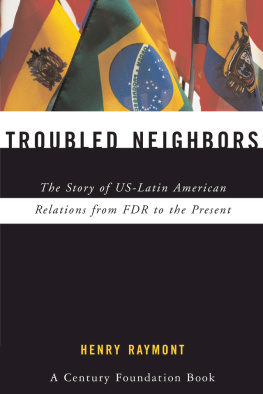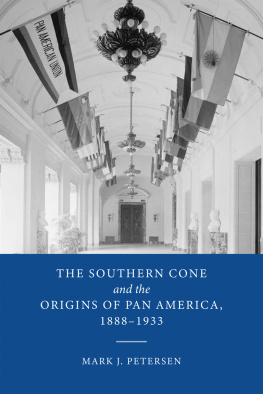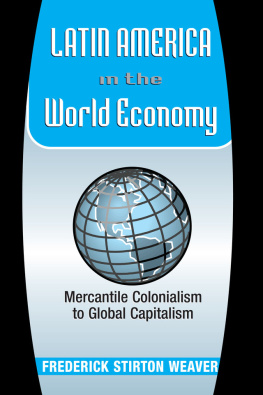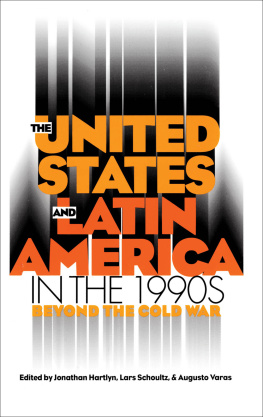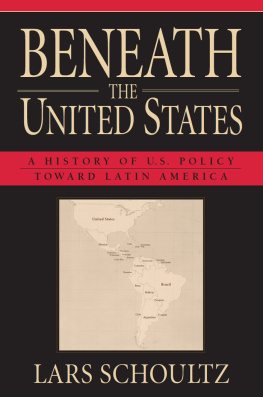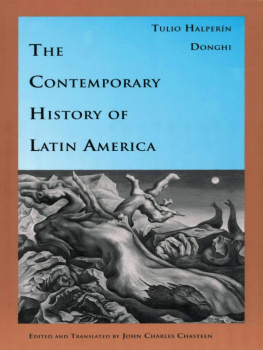First published 2005 by Westview Press
Published 2018 by Routledge
711 Third Avenue, New York, NY 10017, USA
2 Park Square, Milton Park, Abingdon, Oxon OX14 4RN
Routledge is an imprint of the Taylor & Francis Group, an informa business
Copyright 2005 by The Century Foundation, Inc., formerly the Twentieth Century Fund.
All rights reserved. No part of this book may be reprinted or reproduced or utilised in any form or by any electronic, mechanical, or other means, now known or hereafter invented, including photocopying and recording, or in any information storage or retrieval system, without permission in writing from the publishers.
Notice:
Product or corporate names may be trademarks or registered trademarks, and are used only for identification and explanation without intent to infringe.
Library of Congress Cataloging-in-Publication Data
Raymont, Henry.
Troubled neighbors: the story of USLatin American relations, from FDR
to the present / Henry Raymont.
p. cm.
Includes bibliographical references and index.
ISBN 0-8133-4303-8 (pbk.: alk. paper)
1. Latin AmericaForeign relationsUnited States. 2. United States
Foreign relationsLatin America. 3. United StatesForeign relations20th
century. 4. Latin AmericaForeign relations20th century. I. Title.
F1418.R39 2005
327.8073'09'045dc22 2004021687
ISBN 13: 978-0-8133-4303-7 (pbk)
The Century Foundation
The Century Foundation, formerly the Twentieth Century Fund, sponsors and supervises timely analyses of economic policy, foreign affairs, and domestic political issues. Not-for-profit and nonpartisan, it was founded in 1919 and endowed by Edward A. Filene.
| Board of Trustees of The Century Foundation |
|---|
| H. Brandt Ayers | Jessica Tuchman Mathews |
| Peter A. A. Berle | Alicia H. Munnell |
| Alan Brinkley, Chairman | P. Michael Pitfield |
| Joseph A. Califano, Jr. | John Podesta |
| Alexander Morgan Capron | Richard Ravitch |
| Hodding Carter III | Alan Sagner |
| Edward E. David, Jr. | Arthur M. Schlesinger, Jr. |
| Brewster C. Denny | Harvey I. Sloane, M.D. |
| Christopher Edley, Jr. | Theodore C. Sorensen |
| Charles V. Hamilton | Kathleen M. Sullivan |
| Matina S. Horner | Shirley Williams |
| Lewis B. Kaden | William Julius Wilson |
| James A. Leach |
| Richard C. Leone | Richard C. Leone, President |
During the second half of the twentieth century, World War II and the Cold War defined the central interests of US policy in the Americas. "Our own backyard," in this context, was an arena where our view of the world should be paramount, with other, more local considerations relegated to secondary status. From time to time, when an issue, an insurrection or a dictator forced special concern, the US response would be swift and usually heavy handed. Roosevelt's Good Neighbor policy, Kennedys Alliance for Progress, Bush's Enterprise for the Americas Initiative and other forward-looking enterprises sometimes seemed to offer the hope that there would be a permanent shift in approach, but all proved to be temporary. With tiresome certainty, American policy would slip back into the unfortunate mix of inattention, rigidity and occasional insistence.
Since the end of the Cold War, however, there have been significant changes in relations between the United States and its southern neighbors. Unencumbered by the potentially life-and-death imperatives of the struggle against a hostile Soviet Union, American political leaders have been eager, at least sometimes, to rebuild relationships based on questions that go far beyond the former emphasis on undermining regimes seen as too "soft on communism" and supporting those governments, whatever their other characteristics, that were staunchly pro-American. Over the same decade and a half, the movement of many of the countries of Central and South America from military or one-party rule to civilian and democratic government has made progress on broader economic and political matters more practical and likely. Overall, for the first time, widespread and enduring democracy coupled with steady and broad-based economic growth seems likely to become the norm for most nations in the Americas.
The adoption of the North American Free Trade Agreement by the United States, Canada and Mexico, of course, is the outstanding example of a breakthrough in policy of real substance. On a more rhetorical but still important front, the advocacy by both the Clinton and Bush (II) administrations of freer trade with several South American nations has signaled a possible long-term agenda for wider cooperation. Still, much of American policy toward Latin American nations can be characterized as a patchwork approach. The simple fact is that, most often, statesmen in the United States more or less intentionally want to keep the region off the list of high-priority areas.
While the relationship between the United States and its southern neighbors has been and is of considerable scholarly interest, the subject remains evergreen for attention. Geography is inescapable, and so is the shared destiny of the New World's peoples. This work, by Henry Raymont, a knowledgeable observer of the region, builds on that premise to provide fresh insights into the past and important advice about the future.
Raymont, currently a syndicated columnist for a number of Latin American papers, has been a journalist specializing in Latin American issues for five decades, first with the United Press and then with the New York Times. In addition, he has served as director of cultural affairs at the Organization of American States; been a senior fellow at the Joan Shorenstein Center on the Press, Politics, and Public Policy; and received a Nieman Fellowship for his reporting from Cuba.
Ultimately, the question that Raymont explores is that of leadership. He asks, in effect, given particular conditions, to what extent did each president choose to pursue constructive policies with regard to the Americas. In this sense, explanations of US policy that, for example, assert that preoccupation with Cold War concerns accounts for the behavior of this administration or that one miss a key question. For, even within the limits imposed by the particular urgencies of the global contest with the Soviet Union, there were real choices to be made, questions of emphasis, calculations of long-term interests, beliefs about what works and what does not. Strong leadership in foreign policy, Raymont would argue, can change the calculus of the possible, reshape the public (and media) agenda and overcome the forces of the status quo and the resistance of partisan opposition.
The fact that leadership and competence matter may seem a commonplace observation. But, in these times of relative political timidity, it is a point well worth remaking. Moreover, presenting solid evidence of the abiding significance of policymakers, as Raymont's book does, provides an important reminder that we have the right to hold them accountable. In other words, our leaders, our nation and our neighbors are not in the grip of uncontrollable international forces. We can do much to shape our common destiny.

